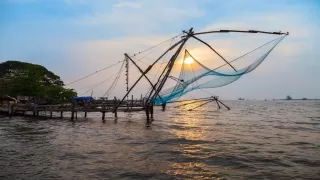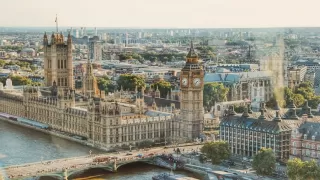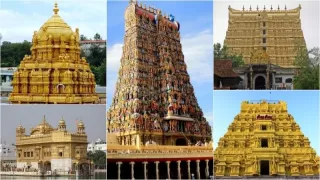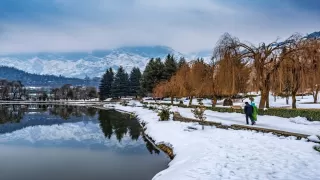Monsoon wreaks havoc yearly in some parts of the country, and it's always advisable to avoid these places during the peak monsoon season in India.
For some places, monsoon is the best season to visit, but for some, it is not.
Top 7 Places to Avoid Visiting in India During Monsoon 2024
Here is the list of a few places that you shouldn't be planning about from July to mid-September to avoid any mishaps.
Himachal Pradesh

Image Source: Twitter
Travel to Himachal Pradesh is currently unsafe due to severe weather. Recent cloudbursts in Shimla and Manali have caused significant destruction, damaging homes and endangering lives. Key routes, such as the Chandigarh-Manali National Highway, are severely disrupted. Rescue efforts are in progress, with several people reported missing. Authorities, including NDRF teams and the Indian Army, are actively involved. Additionally, landslides have closed roads, and heavy rain is expected to continue for the next few days, according to the India Meteorological Department. Considering these risks, it’s best to postpone any plans to visit Himachal Pradesh.
Pune

Image Source: Twitter
It's best to avoid visiting Pune right now due to severe flooding caused by intense rainfall. The city's drainage systems are overwhelmed, leading to significant disruptions. The Khadakwasla Dam has released excess water, causing the Mutha River to overflow and flood low-lying areas such as Deccan, Sinhagad Road, Ekta Nagar, and Pulachi Wadi. Rescue operations are underway, with water levels reaching dangerous heights. The India Meteorological Department forecasts more heavy rainfall, making travel both unsafe and inconvenient. The city's current infrastructure cannot handle the extreme weather, posing risks to residents and visitors alike.
Uttarakhand

Image Source: Twitter
Uttarakhand is facing severe weather, including deadly cloudbursts and heavy rains. Recently, a cloudburst in Ghansali resulted in two fatalities and one injury, while another near the Kedarnath path caused a landslide, leaving 200 pilgrims stranded. The continuous downpour has raised the Mandakini River’s water level, leading to evacuations. With emergency services on high alert and prioritizing rescue operations, travelling to the region is currently unsafe due to these unpredictable and dangerous conditions.
Kerala

Image Source: Twitter
Due to recent severe landslides in Wayanad, Kerala, triggered by torrential rains, it is currently unsafe to visit. The disaster has resulted in at least 144 fatalities, hundreds of injuries, and over 190 missing persons. The region is experiencing major disruptions with uprooted trees, buried villages, and impassable roads. Rescue operations are ongoing, and temporary shelters house more than 8,000 displaced individuals. As a major tourist destination, Wayanad's natural beauty is currently overshadowed by this tragic event, making it crucial to avoid travel to ensure safety and allow recovery efforts to proceed.
Assam

Image Source: Twitter
Assam frequently experiences severe flooding during the monsoon season due to its vast network of rivers, including the Brahmaputra and Barak. These rivers and their tributaries often overflow, causing significant floods, landslides, and erosion. The Brahmaputra River, which spans 2900 km, and the Barak River, with its rain-fed tributaries, intensify these issues during heavy rains. These natural disasters disrupt daily life and transportation, posing serious safety risks. Therefore, it is best to avoid visiting Assam during the monsoon season to ensure your safety and well-being.
Meghalaya

Image Source: Twitter
Visiting Meghalaya is not recommended at the moment due to severe flooding and landslides triggered by intense monsoon rains. Since June 1, 2024, the state has seen 44% more rainfall than usual, causing significant damage and a fatality in East Khasi Hills. Four villages in West Garo Hills are isolated, and many roads are blocked or damaged across various districts. Relief operations are in progress, but infrastructure remains heavily affected. It’s best to postpone travel until conditions improve and repairs are completed.
Odisha

Image Source: Twitter
Given Odisha's current challenges, visiting might not be ideal right now. Chief Minister Mohan Majhi has recently appealed to the Niti Aayog for a financial package to bolster disaster resilience in power, telecom, and coastal infrastructure. Cyclone Fani's aftermath revealed significant vulnerabilities, severely damaging power infrastructure and prolonged outages. The state faces ongoing issues with inadequate infrastructure, including damaged electric poles and urgent needs for improved embankments and cyclone-resistant housing. The focus remains on urgent infrastructure upgrades and disaster resilience, making it a less optimal time for travel.
Goa

Image Source: Twitter
Visiting Goa right now might not be advisable due to recent warnings about environmental risks. The recent Wayanad landslides, which caused over 150 deaths, have raised concerns about similar events in Goa. This year, Goa has experienced increased landslides and boulders falling on highways. The state's hilly terrain and sandy coastal plains, similar to Wayanad, are vulnerable to such disasters. Reports highlight deforestation and environmental degradation, which have made Goa’s hills and plateaus more prone to landslides, especially during heavy rains. To avoid potential dangers, it’s wise to reconsider travel plans to Goa until these environmental issues are addressed.
Also Read: The 8 Best Offbeat Places To Visit In India























